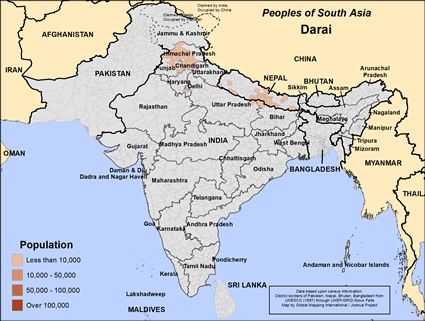The Darai, an indigenous people of Nepal, mainly live all along the western mountainous region, in the inner valley of Chitwan and Nawalparasi. Originally, they are inhabitants of Tanahu, Gorkha, Dhading, Palpa, and the mountainous area of Nawalparasi.The word Darai is a derivative of "Dharroo," which means "physically strong." People from ancient Tanahu used to go to Saranghat (an ancient place in Nawalparasi) for shopping purposes, mainly for salt. On the way, boatmen (now called Bote) used to help them cross the Madi and Buldi rivers. Once, during monsoon season, when there were no boats, a man with a heavy bag of salt from Saranghat tried to cross the river himself but was overcome by the flooded river. Fortunately, a Darai was going to Saranghat, saw him, and saved his life with great effort. People who saw this act praised him calling him "Dharroo Raichha" ("is strong"). Later on, this brave act was made known to all the villagers, and "Dharroo Raichha" simultaneously changed to "Dharrai Ho" ("sure that he is strong"), then "Darai Ho". With the passing of time, all the villagers became known as Darai. The person who nearly drowned was called "Dubouli". Later, the place was known as "Dumauli". Now it is pronounced as Damauli (a city of Tanahu).About a century ago, they migrated to the plains area of Chitwan and Nawalparasi. Only a decade ago, they also migrated to Kailali. There is a saying that Darai people gained residency in Chitwan as a reward when they helped Sen Kings in ancient times.
Home-made alcoholic products play an important role in their rituals. They believe the use of alcohol leads to purity and happiness.Darais enjoy fishing as a hobby rather than as a profession. They also enjoy hunting. They are experts in farming and raise pigs, sheep, chickens, and ducks. Most youngsters are very keen to enlist as soldiers. A few are involved in government official jobs.They speak their own dialect called "Darai Kura". It is heavily influenced by other major ethnic languages, depending on their inhabitants. In the mountainous Darai society there is an influence from the Magar and Gurung language. Likewise, in Chitwan, there is an influence felt from the Tharu language. They do not have their own script.Darai women wear petticoats with a tubular skirt, high or low-necked red/black blouse fastened with ties across the chest, a yellow/blue patuki, necklaces of gold and pittal, a homemade white saul, etc. The men wear homemade daura, kodra, kachhad, bhadgaule and Nepali caps.During Jestha (June-July) they celebrate their own New Year. "Lightning fire" is produced by rubbing dry wood and sharing that fire for cooking, marking the start of the New Year.Darai women have a high place in their society. Elopement is heavily practiced. A wedding party and formal marriage ceremony are observed after having a child. The "Rudi Ghar" and other traditional ceremonies give youngsters the opportunity to be engaged secretly. Marriage is mostly within their own ethnic groups, but also occurs between Magar, Gurung, and Tharu. In their society, most wedding arrangements, especially the food, are typically handled by the bridegroom's family.
Chudka and Ghatu are their own traditional dances and are mainly practiced in the mountainous Darai society. "Sohorai" is their traditional tomb-sweeping day when they dance and sing in memory of those who recently died. They practice devotional meditation involving their deceased ancestors. They light candles and offer homemade alcohol and rice on banana leaves to their ancestors.
They are loyal, kind, unaggressive, and friendly in nature. They work without quarrelling. Because of their naïveté and meekness, they are easily taken advantage of by others. Their economic and academic status is very poor.For their equal participation in every field of the country, genuine and non-selfish support from the government body is urgently needed. The media, which mostly publish news regarding these ethnic groups who are already well known all over the country, must give effective focus to those who are endangered and less discussed.The inequality in selection during national and international jobs (for example, in the acceptance of applicants as soldiers) must be strictly monitored so that the minority can take advantage of these opportunities equally. Racial discrimination within both indigenous and non-indigenous people needs to decrease.
Pray that God would work in the hearts of the Darais to give them a hunger to hear God's word, a solid understanding of Jesus Christ, and the determination to believe the message regardless of the cost.Pray that God sends many loving workers to the Darais.Pray for the handful of believers that God would meet their needs and keep them strong in the Holy Spirit in the face of any form of persecution.
Scripture Prayers for the Darai in Nepal.
Anonymous
| Profile Source: Joshua Project |












